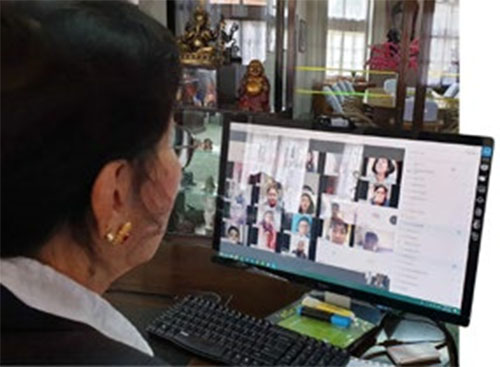COVID-19 outbreak and professional education: Shifting from physical to virtual classes
In early March, I was in Melbourne, reading a book on a beach on a warm sunny day. It was strange that there were very few people there. While returning to the university from the beach, I noticed that people were wearing masks on the tram, and there were very few students attending classes. It came to my realisation that people were becoming very cautious because of the increasing risk of COVID-19. Currently, I am in Kathmandu with my family in Nepal because of the current crisis, but continuing my classes with Deakin University, Melbourne and appearing in the university examinations online. I am sure that there are many cases like this.
The COVID-19 outbreak has created a catastrophic existential health crisis. Inherently it has rooted impact on the way we perceive the world and functioning of our daily lifestyle, including education. Coping with the crisis has become the new norm.
The increasing risk of COVID-19 has resulted in educational institutions - schools, colleges and universities - shutting down across the globe. This has given a rise to a perceptible and drastic increase in e-learning. Teaching is being undertaken remotely and delivered through digital platforms. A large number of educational institutions are implementing a distance learning approach. They are connecting students and teachers through online platforms and tools like Zoom and Microsoft teams.
E-learning can be extremely beneficial as it is instantly accessible and has flexible scheduling. Tools like video conferencing systems, which promote interaction between teachers and students, are used by resourceful universities and colleges. Teachers can use virtual classrooms to teach from home, which renders online sessions to be as effective as the traditional face-to-face classes.
They also offer a great deal of content, interaction, reinforcement and frequent feedback during online sessions. Online learning also allows students to study 24/7 and work at their own pace. For example, a student attending university in Australia can access their lectures through their digital cloud portal at any convenient time and study at their own pace from Nepal.
Given the uncertainty and less possibility of a vaccine for COVID-19 to be available in the next couple of years for a developing country like Nepal, this is a good time to transform the traditional education system to a more digital one and equip our teaching faculties. Nepal could adopt the online learning system as other countries in the world and accept a competitive education system.
It is crucial to accept the change and mould the decisions as per the situation. To serve the students affected by closures of educational institutions across Nepal, the Ministry of Education and especially Tribhuvan University should encourage educational institutions to adopt distance learning, especially for higher degree education and professional courses.
Distance learning methods become even more relevant for a country like ours where many youths have to migrate to the cities and abroad for quality education. There is a debate in the political circle that distance educations will create disparity among the students, between those who can and cannot afford a computer and internet facility. But the fact is that it is economical and fills the gap among the students of different classes, backgrounds and geography if provided with equal access.
Educational institutions in Nepal could work intensively through the portal of electronic communication. An educational portal connects students, educators and school administration effectively. Educational institutions should organise online learning and support to their respective students. There are online assessments for examinations, and institutions should apply appropriate technical solutions to ensure student identification in order to monitor their behaviour and work of the students during the examinations.
Advances in the digital world now allow students to study entirely online while still having the same kind of ambiance, interacting with your classmates, attending lectures and seminars. Distance learning does require a huge level of self-motivation, so educational institutions should ensure that their respective students receive the same level of support through the online platform as they would receive studying on campus.
I believe the pandemic will not only change the existing world order, rather it will change much of our behaviours that we were used to. So, towards the journey of change and living with the new normal, we have to be ready to accept the change.






